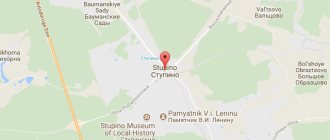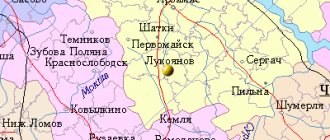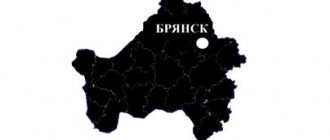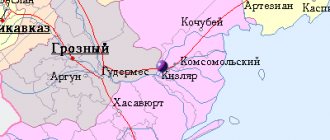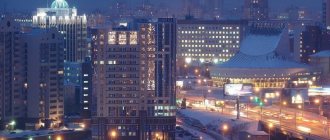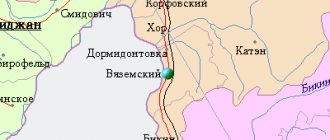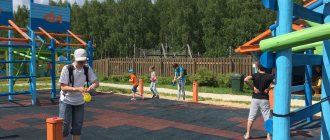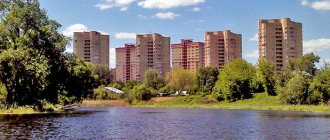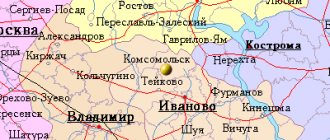| City | |
| Novopavlovsk | |
| 43°57′49″ n. w. 43°38′22″ E. d.HGYAO | |
| A country | Russia |
| Subject of the federation | Stavropol region |
| Urban district | Kirovsky |
| History and geography | |
| Based | 1777 |
| Former names | until 1981 - Novopavlovskaya village |
| City with | 1981 |
| Square | 19 km² |
| Center height | 330 m |
| Timezone | UTC+3:00 |
| Population | |
| Population | ↘26,062 people (2020) |
| Density | 1371.68 people/km² |
| Katoykonim | Novopavlovtsy, Novopavlovtsy |
| Digital IDs | |
| Telephone code | +7 87938 |
| Postal codes | 357300,357301,357302,357303 |
| OKATO code | 07225501000 |
| OKTMO code | 07625101001 |
| Other | |
| Map sheet nomenclature | K-38-4 |
| Novopavlovsk Moscow Stavropol Novopavlovsk | |
| Media files on Wikimedia Commons | |
Novopavlovsk
- city, administrative center of the Kirovsky district (urban district) of the Stavropol Territory of Russia.
The official founding date of Novopavlovsk is September 18, 1777, when the fortress of St. Paul was founded on the right bank of the Kura River.
Geographical position
The city is located on the left bank of the Kura River within the Kabardian foothill plain, not far from the border with Kabardino-Balkaria. Located in the central part of the Kirovsky district. The distance to the regional center is 258 km.
Apollonskaya railway station on the Georgievsk - Prokhladnaya line.
Distance to the regional center by road: 220 km.
Between Novopavlovsk and Gornozavodsky, on the left bank of the Kura River, the Kirovsky zoological reserve is located.
Climate
The territory of the city of Novopavlovsk belongs to the southeastern climatic region. Winter in the city, as in the entire region, begins at the end of December and ends in the first half of March, its duration is 80-90 days. The average temperature in January is 3.9 - −4.4 °C. The height of the snow cover is no more than 10 cm. The number of days with snow cover is 50-60 per year.
The frost-free period lasts 275-285 days. Summer begins in the first ten days of May, lasts 145-150 days and ends in the third ten days of September. The average July temperature is +23 - +24 °C, the maximum reaches +42 - +43 °C.
The standard depth of seasonal freezing is 0.8 m.
The average annual temperature in the city is +12 °C.
According to hydrothermal conditions, the climate of the territory under consideration is characterized as arid.
According to climatic zoning, the territory of Novopavlovsk belongs to region III B. [ source not specified 1275 days
]
People associated with the city
- Aksenov, Ivan Mikhailovich (1935) - teacher, writer, poet, artist, member of the Union of Writers of Russia, honorary citizen of Novopavlovsk
- Arushunyan, Zinavor Nikolaevich (1921) - participant in the Great Patriotic War of 1941-1945, holder of the Order of the Patriotic War, 1st degree and Red Star[25]
- Bondarev, Vasily Pavlovich (1941) - holder of the Orders of the Badge of Honor and Friendship, Honorary Citizen of the city of Novopavlovsk[25]
- Minets, Vasily Semyonovich (1926) - participant in the Great Patriotic War of 1941-1945, holder of the Order of the Patriotic War, I degree, Red Star[25]
Story
On September 18, 1777, on the right bank of the Kura River, the fortress of St. Paul was founded (the second in a row on the Azov-Mozdok defensive line), in the construction of which the Vladimir Dragoon Regiment with the Volga and Khoper Cossacks participated. Next to it was the settlement of Pravoberezhnoe, founded in 1773 by fugitive Yaik Cossacks. At the fortress, the village of Pavlovskaya was settled, consisting of families of Cossacks of the 1st Volga Regiment:593, transferred to the Caucasus in 1778-1779:287.
In 1829 (according to other sources in 1830:593), during the resettlement of the Volga regiment from the abolished Azov-Mozdok line, the village of Pavlovskaya was moved to the left bank of the Malka River:287. In the 1870s, “in official records the name of the village was fixed as “ Staropavlovskaya”
“, although for some time the previous name, “Pavlovskaya,” continues to be used”: 294
In 1848:588 on the left bank of the Kura River, on the site of the village of Pavlovskaya, the village of Novopavlovskaya was founded, which in 1848-1849 was populated by settlers from the Voronezh, Poltava and Kharkov provinces:272.
Article from ESBE (late 19th century):
«Novopavlovskaya - village of Terek region, Pyatigorsk department; 396 courtyards, 3,062 inhabitants; church, school, 7 commercial establishments, 6 mills, 5 industrial establishments; markets in a week.
»
In 1981, the village of Novopavlovskaya received city status and was renamed Novopavlovsk
.
Until May 1, 2022, the city of Novopavlovsk
as its only settlement within the Kirov municipal district, transformed by merging all abolished settlements into the Kirov urban district.
Chairmen of the Duma
- Kundryukov Dmitry Nikolaevich
Heads of Administration
- from March 13, 2011 - Kuznetsov Vladimir Fedorovich, head of the urban settlement,
- from March 4, 2016 - Zmievsky Anatoly Alexandrovich.
The city of Novopavlovsk is the administrative center of the Kirovsky district of the Stavropol Territory. Railway station - Apollonskaya, North Caucasian Railway. Novopavlovsk is located 258 kilometers southeast of the administrative center of the Stavropol Territory - the city of Stavropol.
The territory of Novopavlovsk is 26 thousand square meters. km. Currently, the city's population is 27 thousand people.
The emergence of this settlement is associated with the construction of the Azov-Mozdok line in 1777 to protect the southern possessions of Russia from attacks by the Crimean Tatars and mountain peoples. This line consisted of 10 fortresses, including the Pavlovsk Fortress, named after the Holy Apostle Paul.
Construction of the Pavlovsk fortress began on September 18, 1777. 140 Cossacks of the Volga and Khoper regiments were settled in it. The houses were built in the settlement of Pravoberezhny, founded back in 1773 by a group of Yaik Cossacks. After the founding of the fortress, this settlement began to be called the village of Pavlovskaya. The fortress with the adjacent village became an important outpost.
A significant part of the residents of the village of Pavlovskaya in 1826-1830. was moved to the Malka River. The remaining part of the inhabitants and immigrants from Ukraine who moved to the Caucasus formed the village of Novopavlovskaya on the left bank of the Kura River. In 1864, the Pavlovsk fortress, having lost its strategic importance, was razed. Novopavlovsk settlers made up part of those resettled in 1846-1848. 1000 families of Little Russian Cossacks to the Caucasus.
By 1914, a two-year school and a parochial school were already functioning in Novopavlovskaya.
In 1981, the regional center - the village of Novopavlovskaya - standing on both sides of the Kura River, was transformed into the city of Novopavlovsk . Today the city covers an area of 1,855 hectares and is home to 23.2 thousand people (or 34.7 percent) of the area’s population. The North Caucasian Railway and an extensive transport network pass through the city, including highways to the cities of Georgievsk, Pyatigorsk, and Prokhladny.
The city has a certain production potential, but the main direction of the city's economy is agricultural production.
In the center of the city there is a monument - a mass grave - to soldiers who died during the Civil and Great Patriotic Wars, the names of 18 heroes from the 34 Separate Guards Red Banner, Order of Suvorov Vitebsk Tank Brigade under the command of General V.I. Filippov, who died for the liberation of Novopavlovsk from the fascist invaders in January 1943, forever carved in stone on a mass grave.
In 1996, the Church of the Vladimir Icon of the Mother of God was consecrated Novopavlovsk At the moment, work is actively underway to restore the Orthodox cathedral, destroyed in the 30s of the last century ( the Church in the name of the Holy Apostles Peter and Paul was built on June 12 (June 29, old style) 1853), which stood in the center of what was then a village Novopavlovskaya.
Telephone code: +7 87938 Official website of the City Administration: www.admnp.ru
Population
| Population | |||||||
| 1856 | 1858 | 1861 | 1865 | 1870 | 1882 | 1890 | 1896 |
| 1766 | ↘1055 | ↗1628 | ↗1780 | ↗2111 | ↗2260 | ↗2548 | ↗2989 |
| 1897 | 1911 | 1939 | 1959 | 1979 | 1989 | 1992 | 1996 |
| ↗3062 | ↗3891 | ↗6400 | ↗7938 | ↗13 542 | ↗18 589 | ↗20 100 | ↗22 300 |
| 1998 | 2000 | 2001 | 2002 | 2003 | 2005 | 2006 | 2007 |
| ↗22 800 | ↗23 100 | ↗23 200 | ↗23 235 | ↘23 200 | →23 200 | ↘23 100 | ↘23 000 |
| 2008 | 2009 | 2010 | 2011 | 2012 | 2013 | 2014 | 2015 |
| →23 000 | ↗23 001 | ↗26 562 | ↘26 559 | ↘26 480 | ↘26 312 | ↘26 293 | ↘26 221 |
| 2016 | 2017 | 2018 | 2019 | 2020 | |||
| ↗26 295 | ↘26 234 | ↗26 238 | ↘26 106 | ↘26 062 | |||
As of January 1, 2022, the city ranked 561st out of 1,115 cities in the Russian Federation in terms of population.
Gender composition
According to the results of the 2010 population census, there were 12,154 men (45.76%) and 14,408 women (54.24%).
National composition
According to the results of the 2010 population census, the following nationalities lived (nationalities less than 1%, see footnote to the line “Others”):
| Nationality | Number | Percent |
| Russians | 21 911 | 82,49 |
| Gypsies | 1696 | 6,39 |
| Armenians | 1396 | 5,26 |
| Ukrainians | 288 | 1,08 |
| Other | 1271 | 4,79 |
| Total | 26 562 | 100,00 |
Links[edit]
Notes[edit]
- ^ abcde Resolution No. 63-p
- ^ a b Federal State Statistics Service (2011). “All-Russian Population Census 2010. Volume 1" [All-Russian Population Census 2010, vol. 1]. All-Russian Population Census 2010 [All-Russian Population Census 2010]
. Federal State Statistics Service. - ^ abcd Law No. 36-kz
- Law No. 88-kz
- "On the Calculation of Time". Official Internet portal of legal information
. June 3, 2011. Retrieved January 19, 2022. - Post office. Information and computing center of OASU RPO. ( Post office
).
Search for postal service objects ( postal Search for objects
) (in Russian) - ↑
Federal State Statistics Service of Russia (May 21, 2004).
“The population of Russia, the constituent entities of the Russian Federation as part of federal districts, urban settlements, settlements, settlements is 3 thousand or more people” [Population of Russia, its federal districts, federal districts, districts Urban settlements, rural settlements - administrative centers and rural settlements with a population of over 3,000] (XLS). All-Russian Population Census 2002
. - “All-Union Population Census of 1989. The current population of union and autonomous republics, autonomous regions and districts, territories, negative phenomena, urban settlements and rural district centers” [All-Union Population Census of 1989: current population of union and autonomous republics, Autonomous regions and districts , territories, regions, districts, towns and villages performing the functions of district administrative centers. All-Union Population Census of 1989 [All-Union Population Census of 1989]
.
Institute of Demography of the National Research University: Higher School of Economics [Institute of Demography of the National Research University: Higher School of Economics]. 1989 - via Demoscope Weekly
.
Infrastructure
- Palace of Culture named after. S. M. Romanko
- Intersettlement Central Library
- Central city library. Opened on October 2, 1951 as the children's department of the Novopavlovsk Children's City Library
- Sports and cultural
- District hospital
- District clinic;
- Emergency medical station;
- Newspaper "Voice of Time"
- District veterinary station
- Cinema "Center"
- Museum of History and Local Lore
- Administration of the Kirov urban district of the Stavropol Territory;
- MFC of the Kirov urban district;
- Interdistrict Inspectorate of the Federal Tax Service No. 1 of Russia;
- Department of Labor and Social Protection of the Population;
- Center for Social Services;
- DOSAAF;
- Novopavlovsk branch of the Federal State Unitary Enterprise Russian Post - 4 branches;
- Pension Fund;
- Kirovsky District Court;
- Magistrate's Court;
- Ingosstrakh;
- Federal Bailiff Service;
- Sberbank of Russia;
- Post Bank;
- Sovcombank;
- City public open cemetery with an area of 402,545 m².
- Department of the Ministry of Internal Affairs of the Ministry of Internal Affairs of the Stavropol Territory;
- Prosecutor's Office;
- Rostelecom;
- Military Commissariat;
- Department of Medical and Social Expertise.
Education
- Kindergarten No. 1 “Thumbelina”
- Kindergarten No. 1 "Rainbow"
- Kindergarten No. 2 “Rucheyok”
- Kindergarten No. 3 “Beryozka”
- Kindergarten No. 4 “Teremok”
- Kindergarten No. 5 “Sun”
- Kindergarten No. 6 “Alyonushka”
- Kindergarten No. 7 named after Ataman G. A. Tutov
- Kindergarten No. 29 “Rosinka”
- Kindergarten "Veterok"
- Gymnasium No. 1
- Secondary school No. 2
- Secondary school No. 13
- Secondary school No. 33
- Children's music school
- Children's art school
- Children's and youth sports school
- Orphanage (mixed) No. 19
- The House for arts and crafts for children
- Novopavlovsk Multidisciplinary College
- Social rehabilitation center for minors “Zarya”
- Ecological and biological center
- Pyatigorsk Medical College. Kirov branch
- College of Economics and Law
Transport
Railway transport
- Railway station (Apollonskaya station)
Motor transport
- Bus station and suburban bus station
City transport
There are 6 public transport routes in Novopavlovsk. You can also get around the city by taxi. You can get from and to the city by bus or minibus from all settlements of the Kirov urban district.
Federal roads
The federal highway P262 passes through the city of Novopavlovsk. You can get in and out of Novopavlovsk by passenger vehicles (from Pyatigorsk, Georgievsk, Mineralnye Vody, Prokhladny, Kursk, Nevinnomyssk, Stavropol, Essentuki, Kislovodsk) and by rail (from Mineralnye Vody, Georgievsk, Prokhladny, Nalchik, Vladikavkaz , Grozny, Stoderevskaya). The nearest airport is 47 km away in Mineralnye Vody. The nearest river port is in Rostov-on-Don.
Excerpt characterizing Novopavlovsk
Blood rushed to Petya's face, and he grabbed the pistol. “Lanciers du sixieme, [Lancers of the sixth regiment.],” said Dolokhov, without shortening or increasing the horse’s stride. The black figure of a sentry stood on the bridge. – Mot d'ordre? [Feedback?] – Dolokhov held his horse and rode at a walk. – Dites donc, le colonel Gerard est ici? [Tell me, is Colonel Gerard here?] - he said. – Mot d'ordre! - Without answering, the sentry said, blocking the road. “Quand un officier fait sa ronde, les sentinelles ne demandent pas le mot d'ordre...” Dolokhov shouted, suddenly flushing, running his horse into the sentry. – Je vous demande si le colonel est ici? [When the officer goes around the chain, the sentries do not ask for feedback... I ask, is the colonel here?] And, without waiting for an answer from the guard who stood aside, Dolokhov walked up the hill at a walk. Noticing the black shadow of a man crossing the road, Dolokhov stopped this man and asked where the commander and officers were? This man, a soldier with a sack on his shoulder, stopped, came close to Dolokhov’s horse, touching it with his hand, and simply and friendlyly said that the commander and officers were higher on the mountain, on the right side, in the farm yard (that’s what he called the master’s estate). Having driven along the road, on both sides of which French conversation could be heard from the fires, Dolokhov turned into the courtyard of the manor’s house. Having passed through the gate, he dismounted from his horse and approached a large blazing fire, around which several people were sitting, talking loudly. Something was boiling in a pot on the edge, and a soldier in a cap and blue overcoat, kneeling, brightly illuminated by the fire, stirred it with a ramrod. “Oh, c'est un dur a cuire, [You can’t deal with this devil.]” said one of the officers sitting in the shadows on the opposite side of the fire. “Il les fera marcher les lapins... [He will get through them...],” said another with a laugh. Both fell silent, peering into the darkness at the sound of the steps of Dolokhov and Petya, approaching the fire with their horses. - Bonjour, messieurs! [Hello, gentlemen!] - Dolokhov said loudly and clearly. The officers stirred in the shadow of the fire, and one, a tall officer with a long neck, walked around the fire and approached Dolokhov. – C'est vous, Clement? - he said. – D'ou, diable... [Is that you, Clément? Where the hell...] - but he didn’t finish, having learned his mistake, and, frowning slightly, as if he were a stranger, he greeted Dolokhov, asking him how he could serve. Dolokhov said that he and a friend were catching up with their regiment, and asked, turning to everyone in general, if the officers knew anything about the sixth regiment. Nobody knew anything; and it seemed to Petya that the officers began to examine him and Dolokhov with hostility and suspicion. Everyone was silent for a few seconds. “Si vous comptez sur la soupe du soir, vous venez trop tard, [If you are counting on dinner, then you are late.],” said a voice from behind the fire with a restrained laugh. Dolokhov replied that they were full and that they needed to move on at night. He gave the horses to the soldier who was stirring the pot, and squatted down by the fire next to the long-necked officer. This officer, without taking his eyes off, looked at Dolokhov and asked him again: what regiment was he in? Dolokhov did not answer, as if he had not heard the question, and, lighting a short French pipe, which he took out of his pocket, asked the officers how safe the road was from the Cossacks ahead of them. “Les brigands sont partout, [These robbers are everywhere.],” answered the officer from behind the fire. Dolokhov said that the Cossacks were terrible only for such backward people as he and his comrade, but that the Cossacks probably did not dare to attack large detachments, he added questioningly. Nobody answered. “Well, now he’ll leave,” Petya thought every minute, standing in front of the fire and listening to his conversation. But Dolokhov again began the conversation that had stopped and directly began asking how many people they had in the battalion, how many battalions, how many prisoners. Asking about the Russian prisoners who were with their detachment, Dolokhov said: “La vilaine affaire de trainer ces cadavres apres soi.” Vaudrait mieux fusiller cette canaille, [It’s a bad thing to drag these corpses around with you. It would be better to shoot this bastard.] - and laughed loudly with such a strange laugh that Petya thought the French would now recognize the deception, and he involuntarily took a step away from the fire. No one responded to Dolokhov’s words and laughter, and the French officer, who was not visible (he was lying wrapped in an overcoat), stood up and whispered something to his comrade. Dolokhov stood up and called to the soldier with the horses. “Will they serve the horses or not?” - Petya thought, involuntarily approaching Dolokhov. The horses were brought in. “Bonjour, messieurs, [Here: farewell, gentlemen.],” said Dolokhov. Petya wanted to say bonsoir [good evening] and could not finish the words. The officers were whispering something to each other. Dolokhov took a long time to mount the horse, which was not standing; then he walked out of the gate. Petya rode beside him, wanting and not daring to look back to see whether the French were running or not running after them. Having reached the road, Dolokhov drove not back into the field, but along the village. At one point he stopped, listening. - Do you hear? - he said. Petya recognized the sounds of Russian voices and saw the dark figures of Russian prisoners near the fires. Going down to the bridge, Petya and Dolokhov passed the sentry, who, without saying a word, walked gloomily along the bridge, and drove out into the ravine where the Cossacks were waiting. - Well, goodbye now. Tell Denisov that at dawn, at the first shot,” said Dolokhov and wanted to go, but Petya grabbed him with his hand. - No! - he cried, - you are such a hero. Oh, how good! How great! How I love you. “Okay, okay,” said Dolokhov, but Petya did not let him go, and in the darkness Dolokhov saw that Petya was bending down towards him. He wanted to kiss. Dolokhov kissed him, laughed and, turning his horse, disappeared into the darkness. X Returning to the guardhouse, Petya found Denisov in the entryway. Denisov, in excitement, anxiety and annoyance at himself for letting Petya go, was waiting for him. - God bless! - he shouted. - Well, thank God! - he repeated, listening to Petya’s enthusiastic story. - Why don’t I sleep because of you! - Denisov said. - Well, thank God, go to bed now. We'll rise again until the end. “Yes... No,” said Petya. – I don’t want to sleep yet. Yes, I know myself, if I fall asleep, it’s over. And then I got used to not sleeping before the battle. Petya sat for some time in the hut, joyfully recalling the details of his trip and vividly imagining what would happen tomorrow. Then, noticing that Denisov had fallen asleep, he got up and went into the yard. It was still completely dark outside. The rain had passed, but drops were still falling from the trees. Close to the guardhouse one could see black figures of Cossack huts and horses tied together. Behind the hut were two black wagons with horses standing, and in the ravine the dying fire was red. The Cossacks and hussars were not all asleep: in some places, along with the sound of falling drops and the nearby sound of horses chewing, soft, as if whispering voices were heard. Petya came out of the entryway, looked around in the darkness and approached the wagons. Someone was snoring under the wagons, and saddled horses stood around them, chewing oats. In the darkness, Petya recognized his horse, which he called Karabakh, although it was a Little Russian horse, and approached it. “Well, Karabakh, we’ll serve tomorrow,” he said, smelling her nostrils and kissing her. - What, master, aren’t you sleeping? - said the Cossack sitting under the truck. - No; and... Likhachev, I think your name is? After all, I just arrived. We went to the French. - And Petya told the Cossack in detail not only his trip, but also why he went and why he believes that it is better to risk his life than to make Lazar at random. “Well, they should have slept,” said the Cossack. “No, I’m used to it,” answered Petya. - What, you don’t have flints in your pistols? I brought it with me. Isn't it necessary? You take it. The Cossack leaned out from under the truck to take a closer look at Petya. “Because I’m used to doing everything carefully,” said Petya. “Some people just don’t get ready, and then they regret it.” I don't like it that way. “That’s for sure,” said the Cossack. “And one more thing, please, my dear, sharpen my saber; dull it... (but Petya was afraid to lie) it was never sharpened. Can this be done? - Why, it’s possible. Likhachev stood up, rummaged through his packs, and Petya soon heard the warlike sound of steel on a block. He climbed onto the truck and sat on the edge of it. The Cossack was sharpening his saber under the truck. - Well, are the fellows sleeping? - said Petya. - Some are sleeping, and some are like this. - Well, what about the boy? - Is it spring? He collapsed there in the entryway. He sleeps with fear. I was really glad. For a long time after this, Petya was silent, listening to the sounds. Footsteps were heard in the darkness and a black figure appeared. -What are you sharpening? – the man asked, approaching the truck. - But sharpen the master’s saber. “Good job,” said the man who seemed to Petya to be a hussar. - Do you still have a cup? - And over there by the wheel. The hussar took the cup. “It’ll probably be light soon,” he said, yawning, and walked off somewhere. Petya should have known that he was in the forest, in Denisov’s party, a mile from the road, that he was sitting on a wagon captured from the French, around which the horses were tied, that the Cossack Likhachev was sitting under him and sharpening his saber, that there was a big black spot to the right is a guardhouse, and a bright red spot below to the left is a dying fire, that the man who came for a cup is a hussar who was thirsty; but he knew nothing and did not want to know it. He was in a magical kingdom in which there was nothing like reality. A large black spot, perhaps there was definitely a guardhouse, or perhaps there was a cave that led into the very depths of the earth. The red spot might have been fire, or maybe the eye of a huge monster. Maybe he is definitely sitting on a wagon now, but it may very well be that he is sitting not on a wagon, but on a terribly high tower, from which if he fell, he would fly to the ground for a whole day, a whole month - keep flying and never reach it . It may be that just a Cossack Likhachev is sitting under the truck, but it may very well be that this is the kindest, bravest, most wonderful, most excellent person in the world, whom no one knows. Maybe it was just a hussar passing for water and going into the ravine, or maybe he just disappeared from sight and completely disappeared, and he was not there. Whatever Petya saw now, nothing would surprise him. He was in a magical kingdom where everything was possible.
